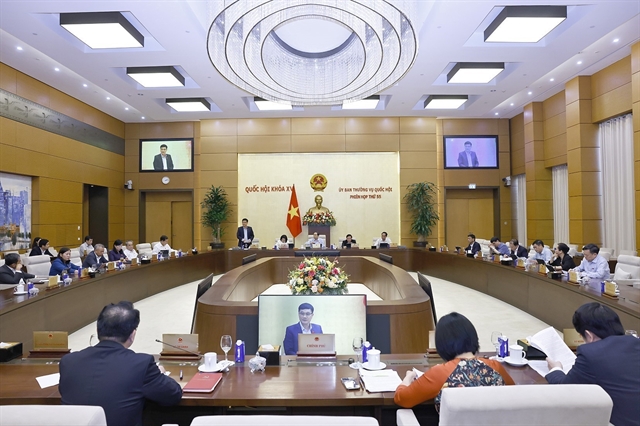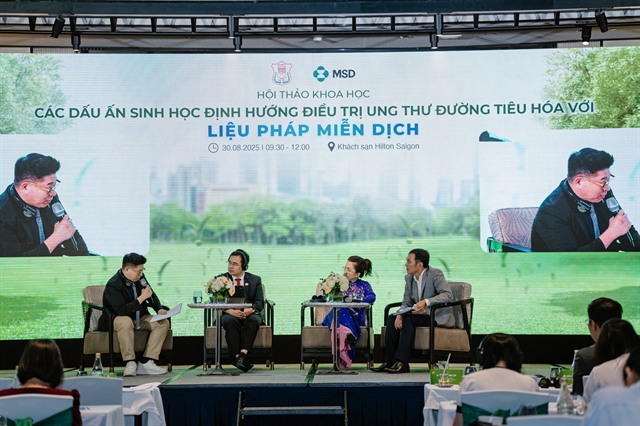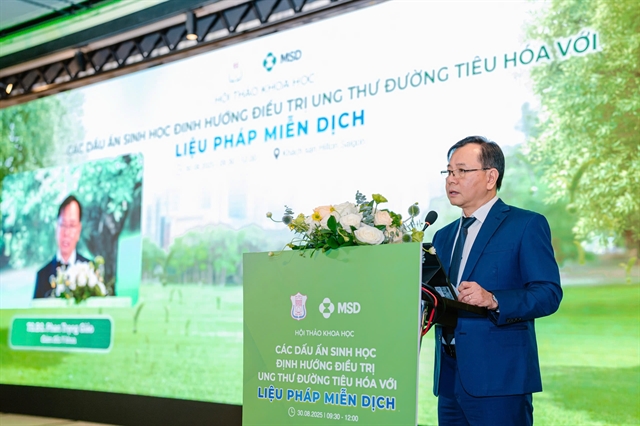 Society
Society

HCM CITY – Research and application of biomarkers in cancer treatment not only offer better survival opportunities for patients but also help the healthcare system utilise resources more efficiently, stressed Assoc Prof Dr Ngô Quốc Đạt, President of the University of Medicine and Pharmacy at HCM City.
Đạt’s statement was made at a scientific symposium titled “Biomarkers Driven in Gastrointestinal Cancer with Immunotherapy” in HCM City.
The symposium, which was co-organised by MSD (known as Merck & Co., Inc., Rahway, NJ, USA in the United States and Canada) and Hanoi Medical University, attracted the attention of many leading domestic and international experts.
The event was chaired by Đạt, and featured presentations from prominent specialists such as Prof Dr Sung Hak Lee from Seoul St. Mary’s Hospital, South Korea; Dr Lê Tuấn Anh from Chợ Rẫy Hospital; MD Specialist II Thái Anh Tú from HCM City Oncology Hospital; and Dr Đoàn Thị Phương Thảo from University Medical Centre HCM City.

|
| Experts discuss and affirm that the application of biomarkers is the key to enhancing the effectiveness of immunotherapy, opening up new pathways for cancer treatment in Việt Nam. -- Photo by Huỳnh Như |
This symposium served as an important forum to discuss and share scientific advances in the application of biomarkers to optimise personalised cancer treatment, particularly gastrointestinal cancers treated with immunotherapy.
The presentations highlighted the critical role of PD-L1, HER2, and MMR/MSI biomarkers in personalising treatment regimens, while also identifying the opportunities and challenges in accurately determining these markers to enhance clinical outcomes.
Numerous examples demonstrated that immunotherapy is creating a breakthrough in cancer treatment, especially for gastrointestinal cancers, bringing new hope to patients worldwide.
Prof Dr Sung Hak Lee, Department of Pathology, Seoul St. Mary’s Hospital, Seoul, South Korea, said: “In patients with locally advanced, unresectable, recurrent, or metastatic gastric adenocarcinoma, assessing the PD-L1 biomarker is of great importance in helping clinicians determine appropriate treatment options.”
“In addition, HER2 expression should also be carefully evaluated in this group of patients to identify suitability for specific immunotherapy regimens. At the same time, all newly diagnosed gastric cancer patients should undergo MSI testing by PCR or NGS, or MMR assessment by IHC, to guide personalised treatment strategies and optimise therapeutic outcomes.”
The symposium also emphasised the crucial collaboration between clinicians and pathologists, and highlighted factors that may contribute to diagnostic discrepancies.
This helps physicians optimise tissue sampling procedures and identify key aspects in specimen handling and analysis, thereby strengthening the capabilities of both pathologists and treating physicians, and ensuring patients receive the most effective treatment regimens.
Dr Phan Trọng Giáo, Medical Director of MSD Vietnam, shared: “With nearly 30 years of presence and development in Việt Nam, MSD is committed to accompanying the medical community in advancing research and applying scientific innovations to bring the greatest benefits to patients. Our initiatives are implemented in alignment with the National Strategy on Non-Communicable Disease Prevention and Control, focusing on healthcare support, capacity building for physicians, and strengthening collaborations to expand access to medical advancements.

|
| Dr. Phan Trọng Giáo, Medical Director of MSD Vietnam, affirm MSD’s commitment to supporting the medical community, advancing research, and applying scientific innovations to deliver the greatest benefits to patients. -- Photo by Huỳnh Như |
"We believe that through today’s symposium, the exchange of ideas and practical solutions will contribute to enhancing knowledge, opening new treatment opportunities, and improving the quality of life for cancer patients in Việt Nam.”
The conference concluded with a strong consensus among experts that applying biomarkers is the key to enhancing the effectiveness of immunotherapy, paving new pathways in cancer treatment in Việt Nam. The ideas and solutions shared are expected to form a foundation for improved clinical practice, ultimately delivering tangible and sustainable benefits for patients.
MSD, for more than 130 years, has brought hope to humanity through the development of important medicines and vaccines. The company aspires to be the premier research-intensive biopharmaceutical company in the world – and today, they are at the forefront of research to deliver innovative health solutions that advance the prevention and treatment of diseases in people and animals. VNS